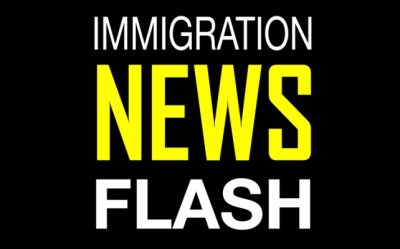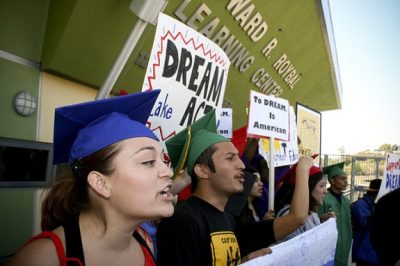Executive Action

136 Law Professors Say President Has Legal Authority to Act on Immigration
After immigration reform stalled in the House, President Obama announced that he plans to “fix as much of our immigration system as I can on my own, without Congress.” A chorus of legal experts and columnists agreed that he’d be on solid ground if he did. Read More

136 Leading Experts on Immigration Law Agree: President Has Legal Authority to Expand Relief
Washington D.C. — U.S. law professors sent a letter today to the White House stating that President Obama has wide legal authority to make needed changes to immigration enforcement policy. The president is considering how to use his authority to mitigate the damage caused by our dysfunctional immigration system… Read More

The President’s Solid Ground for Executive Action on Immigration
Comprehensive immigration reform legislation would give a majority of America’s 11 million undocumented immigrants a path to citizenship and work authorization. But with immigration reform stalled in the House, President Obama announced that he plans to “fix as much of our immigration system as I can… Read More

The President’s Discretion, Immigration Enforcement, and the Rule of Law
The President has the legal authority to make a significant number of unauthorized migrants eligible for temporary relief from deportation that would be similar to the relief available under the Deferred Action for Childhood Arrivals (DACA) program. Read More

President Provides Immediate Relief, Creates Architecture for Reform
Washington D.C. – After decades of congressional neglect, tonight President Obama took a crucial and courageous step toward reforming our immigration system. He announced that he will provide immediate relief for many of those impacted by of our broken system, and he… Read More

Report Says Obama Should “Go Big” on Immigration Action
This week, President Obama concluded that the House would not act on immigration reform this year, leading him to announce that he would use his executive authority to fix what he could of the immigration system on his own. This is a welcome decision, although details of his… Read More

Obama Announces He Will Act Without Congress On Immigration Reform
President Obama said Monday that he plans to take administrative action to “fix as much of our immigration system as I can on my own, without Congress.” As the president explained in his White House speech, his first step is to direct Homeland Security Secretary Jeh Johnson… Read More

Migrant Children Flee Violence in Home Countries
The U.S. is experiencing a growing humanitarian crisis as thousands of children arrive at our southern border after making the harrowing journey from Central America and Mexico to the north. The number on unaccompanied minors arriving has risen at a concerning rate in the past few years and data… Read More

How Should Obama Administration Proceed with Deferred Action Program?
In a June 15th memo announcing deferred action for immigrant youth, DHS Secretary Janet Napolitano gave USCIS 60 days to come up with a process that will allow these young people to affirmatively apply for the chance to work, study, and live in the U.S. without fear of deportation. To be sure, USCIS staff and their counterparts at ICE, CBP, and DHS, have been entrusted with a difficult job—one that requires balancing legal and practical implementation issues against high expectations and years of built up frustration over the lack of immigration reform. But the real challenge is acknowledging that every single decision they make about the program has the chance to make it harder or easier for young people to realize their dreams. Read More

Using All the Tools in the Toolbox
While it is true that Congress makes the laws and the President executes them, it is also true that the President, the Cabinet, and a host of regulatory agencies spend countless hours interpreting and implementing the laws. Congress can never foresee all of the myriad details that must be worked out to actually turn a law into a functioning process. It falls to the executive branch to carry out that work through the regulatory process—the system of rulemaking and public comment that generally takes place after a law is enacted. However, it is often the case that Members of Congress do not agree with how the executive branch has interpreted and implemented a law. Disputes of this nature can quickly escalate from simple disagreement to frenzied hyperbole. Consider the over-the-top political rhetoric which has characterized much of the immigration debate for many years, with any act of generosity towards an immigrant quickly labeled “amnesty” by some lawmakers. Such rhetoric quickly turns into a pitched battle between Congress, as the maker of the law, and the Administration, as implementer of the law. Read More
Make a contribution
Make a direct impact on the lives of immigrants.
